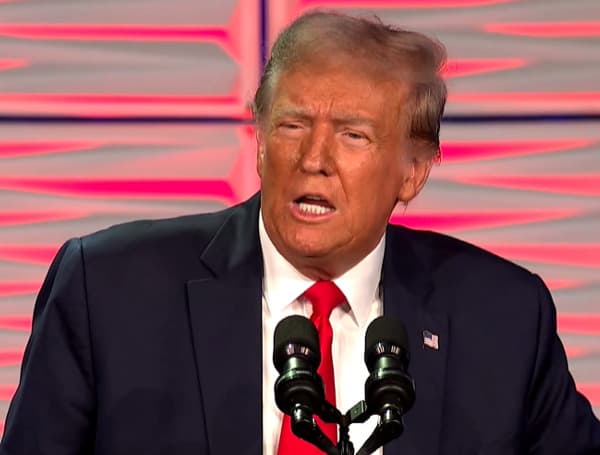The Trump Gag Order in the 2020 election interference case has been a subject of intense debate and legal scrutiny.
A federal appeals court in Washington, D.C. made a ruling Friday, upholding certain aspects of the gag order while narrowing the restrictions on former President Donald Trump’s speech.
This decision has significant implications for the ongoing legal battle and raises questions about the boundaries between free speech and the administration of justice.
Background of the Trump Gag Order Case
The controversy surrounding the Trump Gag Order arose from allegations that the former president attempted to thwart the transfer of power after the 2020 presidential election.
Trump’s legal team argued that he had a good faith basis to question the outcome of the election, as they believed there was widespread fraud. These claims formed the basis of the defense motion filed in federal court in Washington.
Read: Nevada Jury Indicts 6 Republican Alternate Electors Who Said Trump Won 2020 Election
U.S. District Judge Tanya Chutkan imposed the gag order in October, prohibiting Trump from making public statements about special counsel Jack Smith, prosecutors, court staff, and potential witnesses.
The order aimed to protect the integrity of the case and shield individuals involved from harassment and threats that may arise from Trump’s inflammatory social media posts.
The Federal Appeals Court Ruling
A three-judge panel of the U.S. Court of Appeals for the District of Columbia Circuit recently issued a ruling on the Trump Gag Order. While upholding key aspects of the gag order, the court also made modifications to address concerns about the order’s scope.
The ruling allows Trump to make disparaging comments about special counsel Jack Smith, but it maintains the ban on public statements about witnesses and their potential participation in the case.
The court acknowledged that the original order swept too broadly, encompassing constitutionally protected speech that did not impede the court’s functioning or ability to administer justice.
This modification aims to strike a balance between protecting the case’s integrity and preserving Trump’s rights to political speech.
The Court’s Justification for the Gag Order
In its opinion, the court emphasized the importance of upholding the rule of law and treating Trump as any other criminal defendant.
While acknowledging the public’s interest in Trump’s statements as a former president and current candidate for the presidency, the court highlighted the need for him to stand trial under the same procedures that apply to all other defendants.
U.S. Circuit Court Judge Patricia Millet, writing for the court, stated, “Mr. Trump is also an indicted criminal defendant, and he must stand trial in a courtroom under the same procedures that govern all other criminal defendants. That is what the rule of law means.”
Trump’s Response and Potential Appeals
Donald Trump has consistently argued that the gag order is an unconstitutional infringement on his political speech.
He may choose to appeal the recent ruling to the full court or even the Supreme Court. The outcome of any appeals could have far-reaching implications for the case and potentially shape the boundaries of free speech for public figures involved in legal proceedings.
Read: Florida Rep. Matt Gaetz: Dems Are “Green-Lighting” Trump’s Assassination With Dictator Rhetoric
It remains to be seen how Trump’s legal team will respond to the court’s decision and what further actions they may take to challenge the gag order’s constitutionality.
This ongoing legal battle is closely watched by both Trump’s supporters and critics, as it has the potential to impact not only his political future but also the broader discourse on free speech rights.
Impact on the 2024 Presidential Campaign
As the Republican 2024 presidential front-runner, Trump’s ability to make statements criticizing the Biden administration, the Justice Department, and special counsel Jack Smith remains intact.
This ruling allows him to continue claiming that the prosecution is politically motivated and assert his innocence against the charges brought against him.
The court’s decision to narrow the scope of the gag order may impact Trump’s communication strategy during the presidential campaign.
It remains to be seen how he will leverage this opportunity to shape public opinion and rally his supporters.
Continuing Legal Battles and Civil Lawsuit
In addition to the criminal charges, Donald Trump is also facing a civil lawsuit that has the potential to impact his real estate empire and his political future. This civil case adds another layer of complexity to the legal battles surrounding the former president.
U.S. District Judge Tanya Chutkan, the same judge who imposed the gag order, is overseeing the civil lawsuit.
The outcome of this case, along with the ongoing criminal proceedings, could have significant implications for Trump’s personal and political life.
Android Users, Click To Download The Free Press App And Never Miss A Story. Follow Us On Facebook and Twitter. Sign up for our free newsletter.
We can’t do this without your help. Visit our GiveSendGo page and donate any dollar amount; every penny helps.

